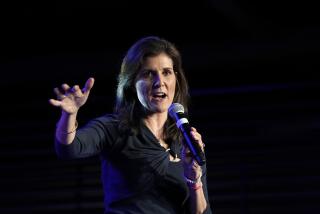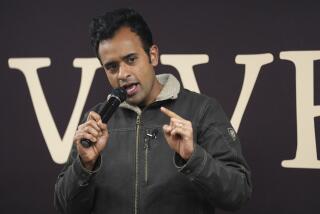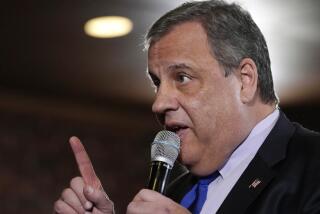Dole Ends Bid for Presidency, Tips Hat to Bush
- Share via
WASHINGTON — Surrounded by colleagues and supporters, Kansas Sen. Bob Dole formally bowed out of the Republican presidential race Tuesday after a week of uncertainty, his public pride undiminished as he surrendered to Vice President George Bush’s inevitable nomination.
“I don’t like to lose. I make no apology for that,” declared the normally combative Dole, his voice firm and absent of bitterness. “I have been beaten before and no doubt will again, but I have never been defeated--and never will be.”
“But,” he added, “one thing you learn to do pretty well in our business is to count. You come to trust your instincts to tell you when it’s over. In my heart, I know that that time is now.”
Urges Republicans to Unite
As Dole closed his five-month campaign in the ornate Senate Caucus Room, he urged Republicans to unite behind Bush, with whom Dole has scrapped repeatedly.
“I congratulate George Bush and wish him well in November,” Dole said. “The bottom line is keeping the White House Republican--that’s the bottom line.”
The senator, whose campaign peaked a mere seven weeks ago with a victory in the Iowa caucuses before disintegrating in the snows of New Hampshire, said he was “ready to do all I can to elect Republicans in November, and doing all I can for our nominee, George Bush.”
Dole’s withdrawal virtually ensures the nomination for Bush, who within several weeks is expected to capture the delegates necessary to earn a first-ballot nomination at the Republican National Convention this summer. Only former religious broadcaster Pat Robertson remains in the Republican race, and he has acknowledged Bush’s victory while continuing to campaign.
Bush was on the road in central Wisconsin when word arrived that his long fight with Dole was over.
His first act was to call Dole and thank him “for the very gracious statement he made.”
‘A Worthy Warrior’
Then, the GOP nominee-apparent spoke to 3,500 townspeople of Stevens Point. “He’s been a worthy warrior, a tough competitor,” the vice president said about Dole.
Bush drew on his own 1980 presidential campaign defeat to offer a word of sympathy to Dole and his family.
“I want to congratulate him on a hard-fought race. And having been there in a similar situation eight years ago, I know how disappointed he and (his wife) Elizabeth and his workers are.”
Pulling the GOP together, Bush said cheerfully, “is not going to be near as tough as what faces the Democrats.”
What faces Dole is a return to the Senate, where he excels at power politics. And both his remarks and his surroundings Tuesday underscored his attachment to the upper house.
Applause From Senators
Senators, Republican and Democrat, surrounded Dole and applauded mightily as he ended his candidacy. Ten minutes before he announced his retirement from the field, Dole strolled through the Senate chamber, slapping backs and joking with the half dozen or so Republicans on the floor.
As he entered the room to offer his farewell, Dole raised his left arm in triumph and came to the podium, where he cracked: “We’re not gonna say anything mean about anybody. It’ll be a nonpartisan event. Not going to attack any Republicans.”
The senator’s family--his wife, Elizabeth Hanford Dole, and his daughter, Robin Dole--flanked him as he spoke. Nearby stood campaign manager William E. Brock III, weeping.
The withdrawal ended a rambling and disorganized campaign that trundled across the nation with little strategy other than what Dole could come up with in the privacy of his traveling car or ramshackle charter airplane.
Dole’s odyssey formally began Nov. 9, when in the comfort of his Russell, Kan., hometown, before thousands of Midwesterners whose votes had sent him to the state Legislature, the U.S. House and then the Senate, he announced his candidacy.
Sets Tone of Campaign
He invoked the accomplishments and his similarities to the nation’s “great heartland presidents,” men like Harry S. Truman and Ronald Reagan, a refrain he would echo through the course of his campaign. He also set the tone of his race with Bush, which would become increasingly bitter as it played out. “I offer a record, not a resume,” Dole said.
In Iowa, a state nearly crushed by economic woes during the Reagan Administration and loathe to repay that with a vote for George Bush, Dole’s organization mounted a methodically planned effort that brought Dole a convincing victory and sent the senator off to New Hampshire. It would prove his ruin.
In New Hampshire, Dole was carried by momentum for days, his campaign aides openly noting that a victory would ensure Dole the nomination. Dole’s pollster, Richard B. Wirthlin, took to calling him “Mr. President.”
But on the last fateful weekend, nervous Bush aides convinced the vice president to air an ad accusing Dole of “straddling” on the issue of taxes, a volatile concern to tight-fisted New Hampshire voters. Dole pollster Wirthlin, convinced that the Kansas senator was headed to victory, advised against countering with ads that ridiculed Bush’s accomplishments in public life. Dole held his tongue. And he lost by nine points.
Momentum Becomes Blunted
A week later, Dole captured the South Dakota and Minnesota contests, but the momentum he expected to gain from those victories was blunted by a shift in interest to the upcoming South Carolina and Super Tuesday primaries.
And it was Bush, on the strength of his fine-tuned organization, his conservative campaign spending and a buoyed confidence from New Hampshire, who swept those events, gathering enough delegates to break the back of the Dole candidacy.
Dole, in the weeks before Super Tuesday and the subsequent Illinois primary, was reduced to bouncing around the states, stopping willy-nilly, offending his local organizers by scrapping appearances at the last minute, relying on his own instincts and those of some national advisers who had little feel for the peculiarities of individual states.
Internal divisions proliferated--in broad daylight a mere 12 days before the biggest campaign day of them all, Super Tuesday, Brock fired two Dole strategists whom the candidate had hand-picked to travel with him.
Worse Problems in Illinois
Things grew even worse in Illinois. There, Dole tried to yank $450,000 worth of advertising on the same day that Brock announced staff layoffs, prompting rumors that the campaign was on the rocks. A 30-minute television advertisement meant to rally his troops in Illinois was riddled by technical glitches.
Publicly, anyway, Dole refused to give in, even after Bush swamped him in Illinois.
“Nothing’s easy in life--for me,” he said. “I don’t give up.”
But friends said reality had set in sharply the day after Super Tuesday.
Dole’s friends and staffers took two approaches, one pressuring him to stay in the race until Bush had earned the 1,139 delegates necessary for a first-ballot nomination, the other suggesting an immediate pullout. Neither group knew what he would do or when.
The campaign changed gears last week, when Dole came out in Washington with a Democrat-bashing foreign policy speech. Two days later, he belittled the economic policies of several Democratic candidates. And on Monday, in a powerful speech, he urged Republicans to look beyond their traditional boundaries and appeal to all groups of Americans.
Tacit Acknowledgement
Gone were the snide insinuations about Bush; replacing them was the tacit acknowledgement that Bush had captured the nomination and that Dole, the Republican loyalist, was bound to support him in the fall.
Aides and friends said Dole was in the race only to explain himself and his issues before stepping to the sidelines.
The campaign ended with the problems that had dogged it from the start still obvious. Running against the incumbent vice president to a still-popular chief executive, Dole was unable to hone a message significantly different from that of Bush. The two men, despite their vast personal differences, were still two pragmatic conservatives with similar views courting essentially the same Republican audience.
“We did not have the campaign in force early enough,” New York Sen. Alphonse M. D’Amato, a Dole backer, said Tuesday. “There should have been a theme. There was no theme.”
Lacks Key Elements
Flaws in Dole’s organization were abundant. He lacked a strong, cohesive group of advisers and grass-roots volunteers, such as those who carried Bush through the tough days after Iowa to his ultimate victory. Ironically, the one time Dole listened to his advisers--in New Hampshire--they steered him wrong.
() Dole’s campaign press secretary, Mari Maseng, said the senator decided Monday night to formally withdraw. “He’s been talking about the possibility for several days,” she said. “As he has done everything, he did this on his own timetable.”
As he left Tuesday, Dole paid homage to the issues that propelled him through the race--the deficit and foreign policy.
“Today, here I am,” he said. “Bloodied but unbowed.”
Staff writer John Balzar in Wisconsin contributed to this story.
More to Read
Get the L.A. Times Politics newsletter
Deeply reported insights into legislation, politics and policy from Sacramento, Washington and beyond. In your inbox twice per week.
You may occasionally receive promotional content from the Los Angeles Times.









